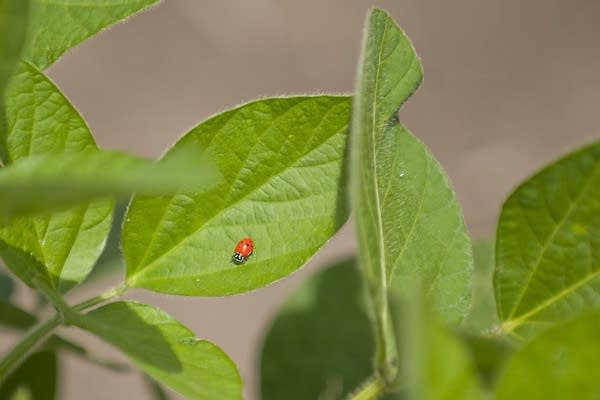Study finds bug diversity cuts down on crop pests

Go Deeper.
Create an account or log in to save stories.
Like this?
Thanks for liking this story! We have added it to a list of your favorite stories.
A new study says insect diversity in farm fields in our region can reduce the need for pesticides.
Pesticides are widely used on corn and bean fields in the region and are often blamed for declines in valuable insects. The study shows that farmers may need to spend less on pesticides once they understand how biodiversity works in farm fields.
Scientists examined insect diversity in cornfields on 53 eastern South Dakota farms. When they counted all the different bugs, they found something interesting.
"Crop fields that had a lot of diversity in them had fewer pests," said USDA scientist Jonathan Lundgren.
Turn Up Your Support
MPR News helps you turn down the noise and build shared understanding. Turn up your support for this public resource and keep trusted journalism accessible to all.

Even where pesticides were not used, the fields with many different bugs had fewer of the bad bugs that damage crops.
Economics professor Scott Fausti of South Dakota State University analyzed the relationships among all those insects. He said this is among the first studies to actually quantify the importance of insect networks in a farm field.
"It is the relationships among herbivores and predators that determines whether corn insect pests will be either controlled by the ecosystem or, if the ecosystem has been diminished, then that will allow the corn insect pest to thrive," he said.
So it's not just how many insects are in the field; it's the connection between bugs that eat plants and bugs that eat other bugs.
Lundgren said that scientists don't know very much about insect diversity. But understanding how insects network, and what that means for pest control, could change how farmers manage pests.
"We often think about biodiversity as something that needs to be conserved someplace else. Maybe in the Brazilian rainforest or something," he said. "But biodiversity is really important close to home as well."
"The really sort of sexy part of this study is that now that we know that biodiversity is important, we can design cropping systems where we have a lot of diversity to help reduce insecticide inputs or pesticide inputs in general," he said.
Recent trends in agriculture threaten insect biodiversity, Lundgren said. Fewer crops are grown, and pesticide use has increased on the major crops like corn and soybeans. Systemic insecticides are commonly used on those crops even if there is no pest threat.
The study authors estimate U.S. farmers spent $3.2 billion to control corn pests in 2013.
Corn is the most intensively produced crop in North America, covering about 5 percent of land surface in the United States.
The scientists plan to expand their research to other crops to see if the same principle applies. They also hope to put a number to the economic benefits of insect diversity.
Lundgren hopes this study will persuade farmers to reconsider preventive insecticide use on crops.
"Pesticides are best applied when you have a pest problem," he said. "Otherwise it doesn't make economic sense to use a pesticide. And there's cost to the use of those pesticides, both in terms of the bottom line of the farming operation, but also the environmental cost."
Lundgren said reducing insecticide use, planting cover crops and using reduced tillage on farmland all help build a healthy insect community.
The study is being published Friday in the journal Science Advances.



